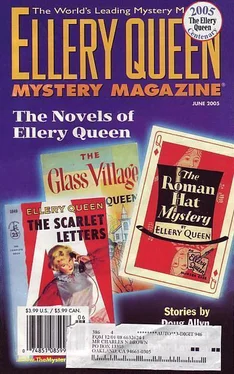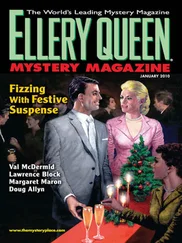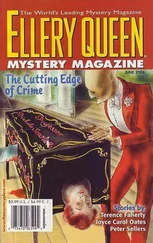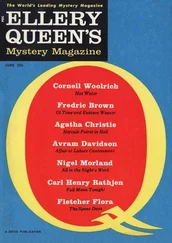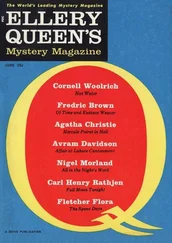Doug Allyn - Ellery Queen’s Mystery Magazine. Vol. 125, No. 6. Whole No. 766, June 2005
Здесь есть возможность читать онлайн «Doug Allyn - Ellery Queen’s Mystery Magazine. Vol. 125, No. 6. Whole No. 766, June 2005» весь текст электронной книги совершенно бесплатно (целиком полную версию без сокращений). В некоторых случаях можно слушать аудио, скачать через торрент в формате fb2 и присутствует краткое содержание. Город: New York, Год выпуска: 2005, ISBN: 2005, Издательство: Dell Magazines, Жанр: Детектив, на английском языке. Описание произведения, (предисловие) а так же отзывы посетителей доступны на портале библиотеки ЛибКат.
- Название:Ellery Queen’s Mystery Magazine. Vol. 125, No. 6. Whole No. 766, June 2005
- Автор:
- Издательство:Dell Magazines
- Жанр:
- Год:2005
- Город:New York
- ISBN:ISSN 1054-8122
- Рейтинг книги:3 / 5. Голосов: 1
-
Избранное:Добавить в избранное
- Отзывы:
-
Ваша оценка:
- 60
- 1
- 2
- 3
- 4
- 5
Ellery Queen’s Mystery Magazine. Vol. 125, No. 6. Whole No. 766, June 2005: краткое содержание, описание и аннотация
Предлагаем к чтению аннотацию, описание, краткое содержание или предисловие (зависит от того, что написал сам автор книги «Ellery Queen’s Mystery Magazine. Vol. 125, No. 6. Whole No. 766, June 2005»). Если вы не нашли необходимую информацию о книге — напишите в комментариях, мы постараемся отыскать её.
Ellery Queen’s Mystery Magazine. Vol. 125, No. 6. Whole No. 766, June 2005 — читать онлайн бесплатно полную книгу (весь текст) целиком
Ниже представлен текст книги, разбитый по страницам. Система сохранения места последней прочитанной страницы, позволяет с удобством читать онлайн бесплатно книгу «Ellery Queen’s Mystery Magazine. Vol. 125, No. 6. Whole No. 766, June 2005», без необходимости каждый раз заново искать на чём Вы остановились. Поставьте закладку, и сможете в любой момент перейти на страницу, на которой закончили чтение.
Интервал:
Закладка:
“You’ve got a ton of nerve, coming out here. Tay Maggert’s still in the hospital. They have to operate on his knee.”
“I’ll send him a card. What about those shots?”
“We hear shots all the time. Poachers bang away at anything that moves in these woods. Probably just a stray round.”
“These weren’t strays. Somebody fired from the beach less than a mile from here. He used a stump for a rest and he was aiming directly at my place. We even found the brass he left behind. Seven-millimeter Magnum.”
“A lot of guys hunt with that round. Common as dirt up here.”
“Really? Do you own a seven-millimeter, Mr. Stegman?”
“I own three. This is gun country, Raven. NRA heaven. And like I said, seven-mils are—”
“—common as dirt, right. Why don’t we step outside, Mr. Stegman?”
“Look, I don’t want any trouble—”
“No trouble. I just want to show you something.”
Rising warily, Stegman followed Beau and Shea out. Beau strode to the Escalade, pulled Puck’s ancient 30/30 out of the backseat. Stegman paled, backing away.
“Relax, Mr. Stegman, I’m not here to shoot anybody. But I do need a likely target. How about that weather vane?”
“Hey, wait a minute—”
Racking the rifle one-handed, Beau shouldered it and fired, three times in as many seconds, punching holes through the copper rooster atop the barn. The third round blew it off the roof. The gunfire brought loggers charging out of the building in their goggles and hard-hats. But everyone froze when they saw Raven with the rifle.
“Sorry about your bird, Mr. Stegman. I’ll admit, clocking a copper rooster is nothing to crow about, even one-handed. Weather vanes can’t shoot back. But from now on, my building can. I was a sniper in the Marine Corps, trained to punch out a playing card at two thousand yards. A man’s a much bigger target, even across a bay. Fair warning, the next weasel who uses my building for target practice will go home in a box.”
“Why tell me?” Stegman blustered. “I told you I don’t know anything about it.”
“You’re head of a citizen’s committee, right? I’m counting on you to get the word out. Before somebody gets hurt. Send me a bill for the rooster.”
“That was quite a show you put on back there,” Puck said. They were in the Escalade, driving back to town.
“Let’s hope it works.”
“They got the message,” Shea said. “They may not like you, Mr. Raven, but nobody wants to get killed over a building. If that guy this morning was really serious about hitting somebody he could have set up closer.”
“How about you, Mr. Raven?” Puck asked. “Were you serious? About shooting back, I mean.”
Raven glanced at him but didn’t answer. Which was answer enough.
Shea turned to Puck. “Where were you, anyway?”
“Took a look around, talked to some of the guys. Used to work in a backwoods operation back in ‘sixty-one. Fifty-inch buzz saw powered by a Ford 8N tractor. Stegman’s got himself a real high-tech operation here. Brand new Poulan laser-guided blade. Can zip through sixty-inch oak or take your appendix out. Everybody tricked out in fancy respirator face masks. They look uncomfortable as hell but it must pay pretty good, judging from all that shiny Detroit iron in the parking lot.”
“You don’t miss much, do you, Mr. Paquette?” Beau said.
“Your line of work and mine have somethin’ in common, Mr. Raven. Careless people ain’t around long. Know what else I saw? Two skidders parked beside the barn. Engine was still warm on one of ‘em. And I saw a dead owl. A snowy.”
“Somebody shot a snowy?” Shea asked. “They’re protected, aren’t they?”
“Nobody shot this owl, it was just dead on a sawdust pile. Quite a few dead critters around. Mice and such.”
“Stegman probably puts out rat poison and the owl ate the wrong rat.”
“Could be.” Puck nodded. “Damn shame, though. Snowies are beautiful birds. Not many of them left. Sons of bitches shouldn’t leave their damned poison lying around like that.”
Raven caught the edge in Puck’s tone and glanced curiously at the older man. Puck was staring out the window, lost in thought.
So Beau let it pass. Which was a mistake.
By midafternoon, construction was back in full swing. Roofers were shingling and laying down new felt while the ironworkers continued assembling the structural beams inside.
Raven disappeared for a few hours. When he came back, he started toting boxes into the office.
“What’s all this?” Shea asked.
“A cot, sleeping bag, a little space heater. I’m moving in for the duration.”
“Sounds cozy,” Puck said. “Want some company?”
“No. It’s too dangerous now. I don’t want anybody else getting hurt.”
“Neither do I, Mr. Raven. That’s why I’ll be here, too. And the next time we have trouble, I’d better do the talking.”
“Meaning what?”
“You’re a scary fella, Mr. Raven. Stomped that logger into the hospital and blew away Stegman’s weather vane one-handed. You’ve also got some baggage from growing up in this town. And kind of a short fuse. Bad combination.”
“Maybe you’re right,” Beau admitted. “Fair enough, Mr. Paquette, the next time we get company, you can do the talking. Just be ready to duck.”
“Sonny, I been ready to duck since the first day I met you.”
Raven snapped awake. Listening. Checked the clock. One-forty hours. Across the darkened office, Shea was snoring softly on his cot. Puck was in a chair by the window in his long johns, silver hair awry, watching a sliver of moon coasting like a galleon through the clouds over the bay.
“What’s that noise?” Beau asked quietly.
“Engines, I think, somewhere across the water. Nothing to do with us.”
“What kind of engines?”
“Couple of trucks, maybe a motorboat. And a skidder.”
“You mean that big log hauler? Why would it be running at two in the morning? Do loggers work at night?”
“Never heard of any who did. Job’s risky enough by daylight. Big trees droppin’, chain saws ripping away an inch from your boots. Bit like your trade, Mr. Raven. On any given day you can come home from work in a bag. Even worse in the old days. All hand labor back then, double-bitted axes and saws. Bullwork. Cold, too. They only logged in the winter.”
“Why?”
“Needed snow to skid the big timber out of the woods. Used horses to drag ‘em to the nearest frozen stream. Come spring, the flood would carry the logs down to the bay. Thousands of ‘em. Like that old picture over the layout table. Log rafts as far as you can see. Know when that was taken? May of eighteen ninety-six. Just before the Great Fire swept through. Burned the forest, the town, this old sawmill. Quarter of a million acres burned down to the ground that year. Three hundred dead. Before my time, of course, but my granddad said the land looked like Hiroshima after the bomb. Nothing but ashes for hundreds of miles. Railroad tracks twisted like pretzels, whole towns erased like they’d never existed.”
“Must’ve been God-awful.”
“Damn straight. But afterward, the people came back, the land came back. And a hundred years later, here we are.”
“I get the feeling you’re trying to tell me something, Mr. Paquette.”
“Maybe one thing. A lot of folks around here are kin of the same families who burned out in ‘ninety-six. Grandsons, granddaughters. Bad as those times were, they toughed it through, put things back together. Different breed than folks in the cities down below. Harder, maybe. But good people all the same. You give ‘em time, I believe they’ll come around.”
“I’ve never been much on patience.”
Читать дальшеИнтервал:
Закладка:
Похожие книги на «Ellery Queen’s Mystery Magazine. Vol. 125, No. 6. Whole No. 766, June 2005»
Представляем Вашему вниманию похожие книги на «Ellery Queen’s Mystery Magazine. Vol. 125, No. 6. Whole No. 766, June 2005» списком для выбора. Мы отобрали схожую по названию и смыслу литературу в надежде предоставить читателям больше вариантов отыскать новые, интересные, ещё непрочитанные произведения.
Обсуждение, отзывы о книге «Ellery Queen’s Mystery Magazine. Vol. 125, No. 6. Whole No. 766, June 2005» и просто собственные мнения читателей. Оставьте ваши комментарии, напишите, что Вы думаете о произведении, его смысле или главных героях. Укажите что конкретно понравилось, а что нет, и почему Вы так считаете.
